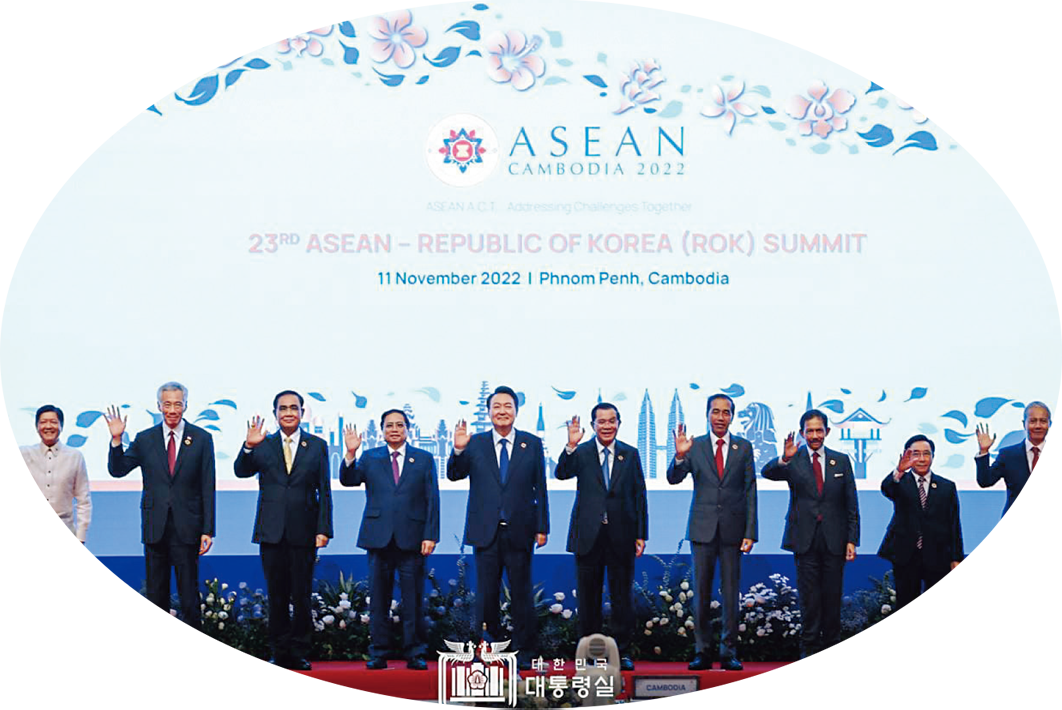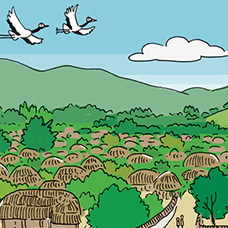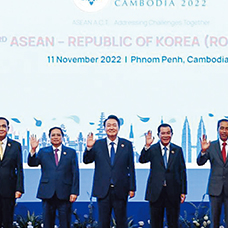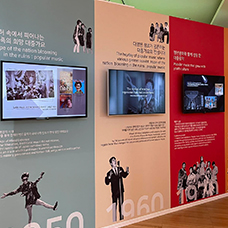Korea Reaffirms Solidarity

President Yoon (fifth from left) on Nov. 11 poses with ASEAN leaders.
WRITTEN BY
Sohn Ji-ae
Photo courtesy of
Office of the President
President Yoon Suk Yeol used his first trip to Southeast Asia to reiterate his firm message that “solidarity” is key to making the world a better place of freedom, peace and prosperity.
Amid growing economic and security threats largely caused by the COVID-19 pandemic and war, the international community sees eye-to-eye on the need for strengthening solidarity to solve growing threats together.
President Yoon Suk Yeol, too, has reaffirmed the importance for solidarity with other countries, saying that international unity and cooperation is the only solution to addressing global challenges.
On his first trip to Southeast Asia in December, Yoon once again reiterated his commitment to solidary by laying out his new vision that calls for international cooperation on building a more free, peaceful, and prosperous world.
ASEAN and G20 Solidarity
Attending a series of summits involving the Association of Southeast Asian Nations (ASEAN) in Phnom Penh, Cambodia, Yoon announced Korea’s new “ASEAN National Solidarity Initiative.” The new vision aims to create a free, peaceful and prosperous Indo-Pacific region through solidarity and cooperation with ASEAN and other major nations.
Unveiling the new strategy was symbolic at a time when the Indo-Pacific region has gained increasing strategic importance for the nation, as well as many parts of the world, amid the U.S.-China rivalry. Some 65 percent of the world’s population lives in the Asia-Pacific region, which also accounts for more than 60 percent of the world’s gross domestic product. Half of the world’s cargo passes through the region, too.
Yoon promised to work for stronger solidarity with ASEAN to jointly address both security and economic challenges, including nuclear nonproliferation, anti-terrorism, maritime, cyber and health security and supply chain resilience.
“Based on the three key visions of freedom, peace and prosperity, and under the three key cooperation principles of inclusivity, trust and reciprocity, we will implement the Indo-Pacific strategy,” Yoon said.
At the Group of 20 Summit in his next stop, Bali, Indonesia, Yoon once again called on world leaders to work together to enhance solidarity to deal with global issues related to food, energy, national security, and health.
“The preciousness of freedom and importance of solidarity were recalled once again at a time when the global community is regaining the freedom that was restricted by the COVID-19 pandemic through strong health solidarity among global countries. In turn, defending the universal value of freedom from another pandemic depends on the solidarity of the international community,” he said.
Diplomatic Ties on Better Footing
Throughout his six-day Southeast Asia trip, North Korea was high on the agenda in world leaders’ discussions.
The summit between the Korean and Chinese leaders was held on the sidelines of the G20 summit, the first time the two had met since Yoon became president. The meeting came at a crucial time as tension flared on the Korean Peninsula with the North’s record number of missiles tests this year.
Yoon asked Chinese President Xi Jinping to play a “more active and constructive role” in dealing with North Korea’s escalating nuclear and missile provocations. Xi responded that both countries have a common interest in Korean Peninsula issues and need to defend peace. The Chinese leader expressed hoped that Korea will actively improve inter-Korean relations. The Korea-China summit demonstrated China’s willingness to keep dialogue open and reduce disagreements on security issues.
Earlier than the Korea-China summit, Yoon held a series of meetings with the leaders of the U.S. and Japan, as well. The three nations discussed Pyongyang’s nuclear program, the economy, national security and cooperation in regional and international affairs. The trilateral summit led to the adoption of the first Korea-U.S.-Japan joint statement that said the three countries will share real-time information about North Korean missiles as well as strengthen cooperation in economic and national security cooperation through cutting-edge technology, supply chains and energy.
“The current developments on the Korean Peninsula and in the region and beyond require the strongest level of our trilateral coordination,” Yoon said. “The three countries must demonstrate solidarity to show North Korea that such reckless provocations can never succeed.” The U.S. leader, in response, reaffirmed the “ironclad” U.S. commitment to defending Korea and Japan and extended deterrence against the North. The Japanese leader said, “It is extremely, truly timely that the trilateral summit is being held at such a juncture.”
NEWS TICKER
Other Articles
-

Special Ⅰ A Challenge Aimed at Developing Hanok
-

Special Ⅱ Stay, Experience and Drink
-

Trend Houses For All
-

Hidden View A Two-sided Alley
-

Interview Choreographer Kim Bora
-

Art of Detail Outstanding Ornaments
-

Film & TV 20th Century Girl
-

Collaboration The Most Luxurious Canvas
-

Current Korea Korea Reaffirms Solidarity
-

Global Korea Large-scale Exhibition of 50 years of K-pop History
